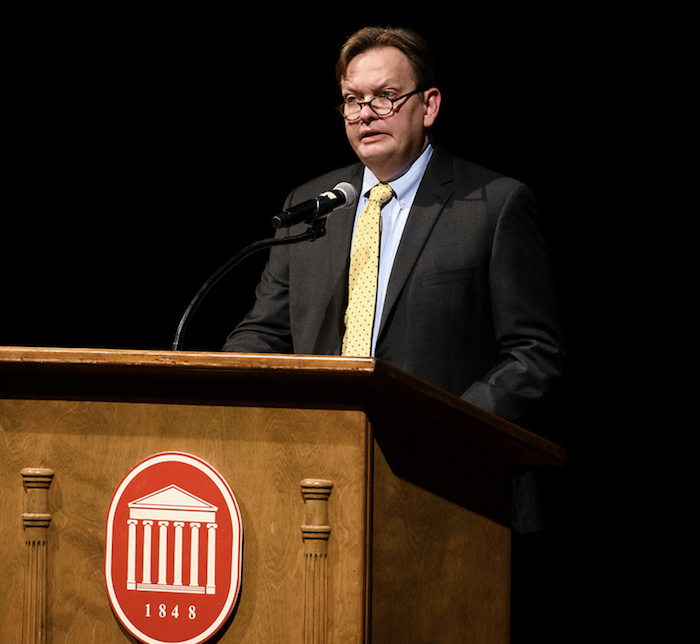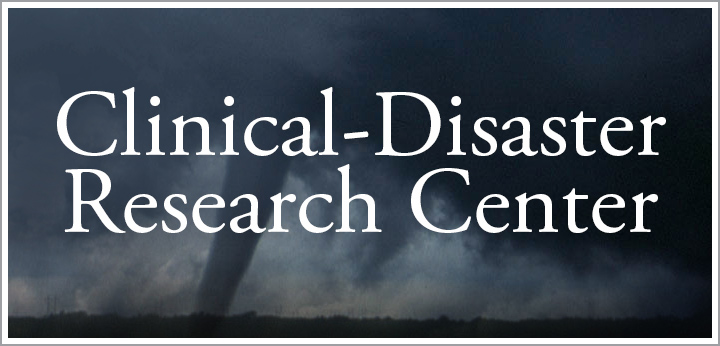Multidisciplinary teams seek significant and innovative solutions
NOVEMBER 21, 2017 BY

Dr. Stefan Schulenberg describes the efforts of the disaster resilience team at the debut of the UM Flagship Constellations initiative. Photo by Thomas Graning/Ole Miss Communications
The University of Mississippi Flagship Constellations initiative includes multidisciplinary teams with the goal of creating solutions in the area of disaster resilience in addition to big data, brain wellness, and community wellbeing.
Each team consists of faculty, staff and students through a collaborative effort to explore and solve complex issues through the diversity of ideas. The constellations also include subthemes, allowing groups to work on multiple projects at once.
“These constellations are made up of brilliant individual stars, yes, but it’s together that they can make their legendary impact,” Chancellor Jeffrey Vitter said. “By working together, we can address compelling challenges where no single discipline has all the answers and where only deep insights from multiple points of view will discover solutions.”
Disaster Resilience Team
The impact of disasters can be detrimental to a community or area. For example, Hurricane Katrina caused more than 1,800 deaths and an economic damage exceeding $200 billion in 2005. In the last decade, disasters cost $1.4 trillion worldwide and have affected 1.7 billion people.
“In our state, we are at increased risk for experiencing natural disasters,” said Stefan Schulenberg, professor of psychology. “We mark time by whether events occurred before Katrina or after, whether they occurred before Camille or after. We know natural disasters very well. They are part of our culture.”
The disaster resilience team will combine research from environmental and legal disciplines with material sciences, information technology and public health. Its aim is to develop the technology and tools to reduce the impact of natural, manmade and environmental disasters and to increase the sustainability of affected communities.
“Given our place and capacities, the University of Mississippi can be a test bed for studying disaster management and prevention,” said Richard Forgette, associate provost. “We are a diverse and critical mass of experts, research centers and support infrastructure centered on advancing knowledge in disaster resilience.”
The team hopes to mitigate all types of disasters by understanding and addressing vulnerabilities.
Provost Noel Wilkin said he is excited about the energy UM faculty and staff have brought to the Flagship Constellations initiative.
“This collaborative initiative has the ability to advance our standing as an academic institution, to magnify the influence of our research on solving major challenges faced by society and to contribute knowledge that will changes the lives of people,” Wilkin said.
“I also hope that it will rekindle your confidence that our faculty and researchers have incredible potential to change the lives of others through their research. I look forward to the meaningful work that will be done and this difference we’re going to make in society.”
Disaster Facts
- Disasters may be natural (flood, storm, earthquake, etc.), man-made (industrial, accidental or malevolent) or environmental (climate change and drought).
- In 2016, more natural disasters struck the United States than any other country except China. (Source)
- The National Weather Service reported that weather-related disasters resulted in more than 450 fatalities in 2016 and resulted in $18.1 billion worth of property damage. (Source)
- The United Nations Office for Disaster Risk Reduction estimates that disasters have cost $1.4 trillion in total damage and affected 1.7 billion people over the past decade. (Source)
- Because of the terrorist attacks of September 11, 2001, more than 2,950 lives were lost. (Source)
- In 2017, the deadliest mass shooting in modern U.S. history occurred when 58 people were killed and more than 500 people were injured in Las Vegas. (Source)
- A 2014 study by the FBI concluded that mass shootings in public places have been on the rise in the 21st century. (Source)
- The total economic damage due to Hurricane Katrina in 2005 exceeded $108 billion with more than 1,800 lives lost. (Source)
- With the threat of tornados, floods, hurricanes, heat waves, earthquakes and more, Mississippi is vulnerable to disasters. (Source)
- Among its state-regulated 5,697 dams, Mississippi has 363 that are classified as high hazard dams whose failure could result in the loss of human life and 55 that are classified as significant hazard dams. (Source)
For more information about these collaborations, visit https://flagshipconstellations.olemiss.edu/disaster-resilience/.

